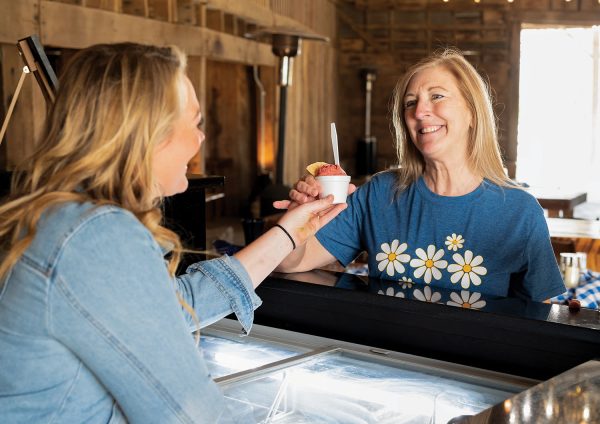WKU geology professor awarded distinguished grant
September 4, 2014
An assistant professor for WKU’s department of geography and geology has just been awarded a special opportunity to further both her students’ studies and her own.
Nahid Gani has been awarded the American Chemical Society-Petroleum Research Fund (ACS-PRF).
“I applied for the grant knowing I would have to compete against all the sciences, not just geology,” she said. “But it was the perfect grant for what I am doing.”
The grant is very competitive and is known nationally as a distinguished award.
With the grant, she will travel to East Africa to further studies she’s been conducting in the area for 13 years. Using thermochronometry, which involves comparing radiometric dates of multiple minerals with different closure temperatures, she will study the timing of incision of the Ethiopian Plateau, near the Blue Nile River system in East Africa, as well as canyon carving reconstruction in the area.
“The Blue Nile is a major branch of the Nile River. It carries 95 percent of the sediment from the Ethiopian Plateau to the lowlands,” Gani said. “My study will help to know the timing of the erosion happening there.”
Gani applied for the grant so that she could collect more data in the East African region.
“East Africa is where the earliest human fossils have been found. I want to know ‘What is the geology that helped them evolve?’” she said. “East Africa is one of the most active regions. The continent is splitting. Eventually, part of East Africa will split from Africa.”
The grant went into effect in July of 2014 and will go until 2016. About 40 percent of the grant money will be spent educating and training students. The grant will also be used to pay for the expensive technology used to do the research. Travel and conference expenses will also be paid for by the grant.
David Keeling, a university distinguished professor of geography and head of the geography and geology department, said that Gani’s hard work and persistence in seeking grant funding are major reasons why she was awarded the grant.
“Faculty invest significant time and energy into preparing, writing and submitting grants for external funding, many of which face stiff competition from larger or more prestigious universities than WKU,” he said.
The grant supports the department’s broader mission of expanding research opportunities globally.
“Dr. Gani now has funding support to travel to a remote part of Africa, to continue very important research on the geologic formations that can lead to the development of important fossil fuel deposits,” Keeling said.
Gani has been working on her current study of the reservoir rock formation since she completed her doctorate in 2007. She has been studying the timing of the formation by documentation of incisions in the plateau. These incisions are necessary in understanding hydrocarbon reservoir development.
One of the biggest challenges Gani faced was managing classes and doing research at the same time.
“I do most of my research during the summer, and I usually don’t teach during the summer,” she said. “It is very rewarding, though, to finish a work and publish it in a journal.”
Another challenge she faces is that all the research she is invested in is done internationally. Gani has to deal with language barriers and either has to know the language of the country or have a translator present.
“In each place I work, I have to get permission before entering a region to start work. I need to help them understand what I am going to do,” she said. “They don’t know all the things that we are studying and you have to be very cooperative with them to get your work done.”
Despite the challenge, Gani said citizens of the countries she works in are always willing to help as long as respect is shown for the country and its people.
The grant will allow for undergraduate students to acquire hands-on work experience alongside Gani, helping with various aspects of her research. It will provide them with the technology to get experience in labs, as well as field experience. They will be taking trips to the Noble Gas Geochemistry and Geochronology lab at Arizona State University.
Any student who has completed their first year of classes is allowed to work with Gani on her research project.
“We have all the technology for them to learn as they work,” she said.
“When a student does a very good job in their research, those are the moments that mean the most. I can see the light in his face that he is actually learning something.”












![Students cheer for Senator at Large Jaden Marshall after being announced as the Intercultural Student Engagement Center Senator for the 24th Senate on Wednesday, April 17 in the Senate Chamber in DSU. Ive done everything in my power, Ive said it 100 times, to be for the students, Marshall said. So, not only to win, but to hear that reaction for me by the other students is just something that shows people actually care about me [and] really support me.](https://wkuherald.com/wp-content/uploads/2024/04/jadenmarshall-1200x844.jpg)




![Megan Inman of Tennessee cries after embracing Drag performer and transgender advocate Jasmine St. James at the 9th Annual WKU Housing and Residence Life Drag Show at Knicely Conference Center on April 4, 2024. “[The community] was so warm and welcoming when I came out, if it wasn’t for the queens I wouldn’t be here,” Inman said.](https://wkuherald.com/wp-content/uploads/2024/04/smith_von_drag_3-600x419.jpg)






